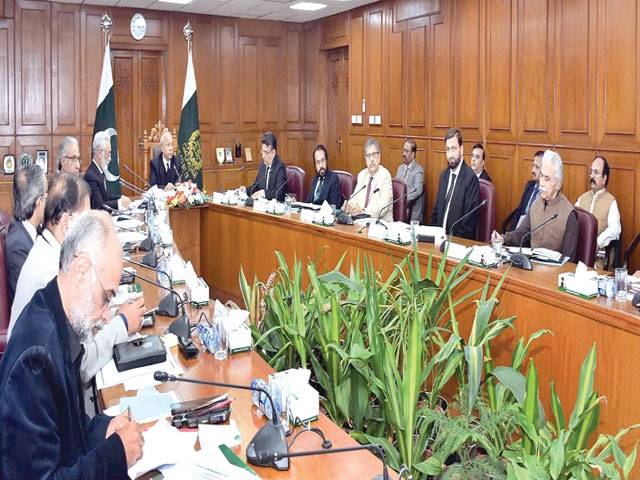ISLAMABAD - A meeting of the National Judicial (Policy Making) Committee (NJPMC) was held under the Chairmanship of Justice Gulzar Ahmed - Chief Justice of Pakistan and Chairman NJPMC - at the Supreme Court of Pakistan building in Islamabad.
On special invitation, the meeting was attended by Justice Mushir Alam, Justice Umar Ata Bandial, and Justice Ijaz Ul Ahsan on behalf of the Supreme Court.
The meeting was also attended by the members of the NJPMC; including Chief Justice Federal Shariat Court, Justice Muhammad Noor Meskanzai; Justice Ahmed Ali M. Shaikh, Chief Justice Sindh High Court (who participated in the meeting through video link); Justice Waqar Ahmad Seth, Chief Justice Peshawar High Court; Justice Athar Minallah, Chief Justice Islamabad High Court; Justice Jamal Khan Mandokhail, Chief Justice High Court of Balochistan; and Justice Muhammad Qasim Khan, Chief Justice Lahore High Court.
Dr. Muhammad Raheem Awan, Secretary National Judicial (Policy Making) Committee (NJPMC) convened the meeting.
Furthermore, on special invitation, Dr. Zafar Mirza, Special Assistant to Prime Minister for Health and Dr. Khurram Shahzad Akram, Incharge Judges Medical Centre, also attended the meeting.
The Chief Justice of Pakistan welcomed the participants and remarked that the prevailing situation on COVID-19 in the country requires special attention and practical actions. He further remarked that the Supreme Court has already issued instructions regarding preventive measures to minimize the spread of the contagion. The Chair mentioned that Dr. Zafar Mirza has been specially invited for apprising the Committee regarding various measures taken by the Federal Government to curb the virus.
The Chief Justice further remarked that we will not compromise on our judicial system and not let it be derailed by getting panicked as people of Pakistan have great deal of confidence in the judicial system, so we will never disappoint them. The apex judiciary of the country will take all the necessary preventive measures for health and safety of our judges, court staff, lawyers, litigants and other justice sector stakeholders up to the district and tehsil levels. He added that detailed instructions have already been issued to all High Courts to take all possible preventive measures by way of case management to ensure that the courtrooms are not crowded and physical contact between individuals attending courts is avoided.
The Secretary of NJPMC briefed the Committee about the prevailing situation on coronavirus in the country. The Secretary also apprised the Committee about preventive measures taken by the apex court, which include avoiding handshakes, regular use of fumigation and disinfectant for cleaning of court premises/offices, cafeterias, Bar rooms, libraries, mosques and committee room, etc.
After deliberations, the Committee unanimously resolved that instructions/guidelines issued by the Supreme Court of Pakistan, shall be adopted by the Federal Shariat Court and High Courts upto the District and Tehsil Courts. Besides, the same may also be forwarded to the superior Judiciary of Azad Jammu and Kashmir and Gilgit-Baltistan.
The Committee also deliberated upon and directed that jail inmates (prisoners) shall be protected from being exposed to the risk of coronavirus/infection without denial of their right of family meetings, however, authorities will make sure to adopt precautionary measures and regulate the procedure of meetings. The Committee also deliberated upon likelihood of jail inmates to be exposed to coronavirus coming from outside, therefore, visitors visiting jail premises should be examined and properly screened to avoid any threat of infection of coronavirus to the prisoners, if any of the prisoner found infected he will be quarantined within jail premises without any delay from the premises.
The NJPMC unanimously resolved to adopt all these SoPs issued by the Supreme Court of Pakistan, which would be applicable on all the Courts. It is further decided that courts will remain open at all levels by reducing the judicial work load, so that the people working in the courts or visiting shall not be exposed to any risk of getting affected by virus. Therefore, people are urged not to unnecessarily visit court premises unless specifically required by any court. It is further resolved that protocol of health and hygiene would be ensured and adopted. In this regard like High Courts, District Courts will also reduce the work by hearing urgent matters and discouraging the entry of general public, as well as, assure to conduct screening tests of all persons entering in the Court premises. It is also resolved that no adverse order against any party would be passed in the courts in default i.e. non-prosecution or ex-parte order, etc.
It was further resolved that the Crisis Management Committees would be formed by the respective High Courts to liaison with the concerned authorities for devising mechanism for safe guarding general public, litigants, lawyers, etc., from the spread of coronavirus in the Federal Shariat Court and respective High Court premises, while for the District Judiciary the Chief Justice High Courts would devise uniform plan/SoPs after consulting with the respective Administrative Committees, District and Sessions Judges and Bars. Besides, the High Courts shall decide suitable protocol for type of urgent cases to be fixed for hearing, the number of Judges to hold Court, the duration of their sessions held on rotation and the corresponding number of judges and the staff that shall be on leave during such sessions.
Justice Ijaz ul Ahsan, Judge Supreme Court of Pakistan has been nominated as focal Judge being Chairman of the Supreme Court Health and Safety Committee to ensure the implementation of the directions of the NJPMC. Whereas, the Federal Shariat Court and High Courts would also nominate a Focal Person to maintain the liaison among the Judiciary, Government Departments and relevant authorities.
It was unanimously agreed that all these measures are taken for three weeks after that these will be reviewed according to the prevailing situation of the county.






